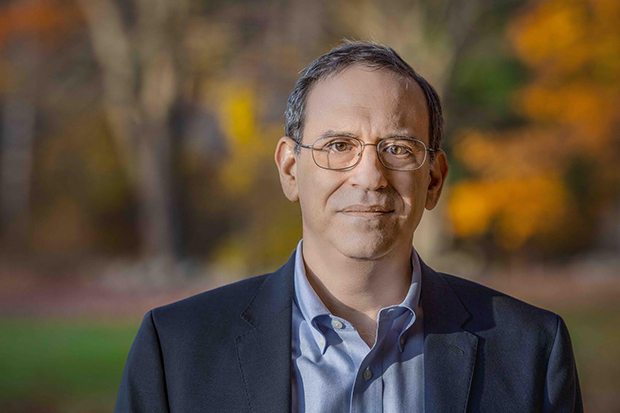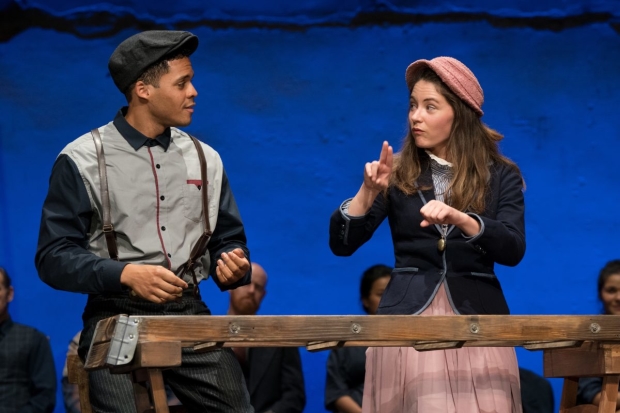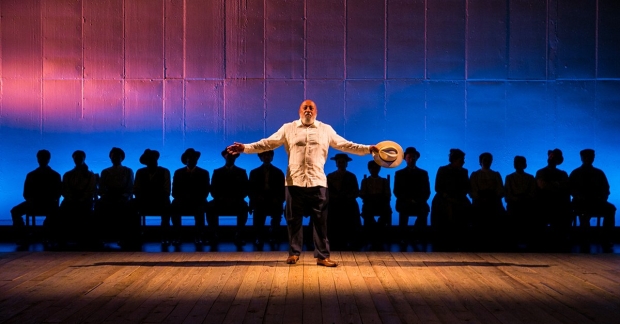Interview: In Another Day's Begun, Howard Sherman Shines a New Light on Our Town
Sherman’s new book is a compendium of oral histories about 21st century productions of this Wilder classic.
In the fall 2017, journalist and arts administrator Howard Sherman noticed, like a lot of regular theatergoers, that productions of Thornton Wilder's Our Town were popping up all over. Deaf West presented an English-ASL staging at the Pasadena Playhouse. Miami New Drama debuted a trilingual version that translated the text into Spanish and Creole. The Olney Theatre Center in Maryland transferred a puppet-heavy version that originally had been done at Two River Theatre in New Jersey. And just months after a suicide bombing during an Ariana Grande concert, Manchester, England's Royal Exchange Theatre staged the play in a revival that, according to one review, claimed this then-79-year-old, all-American drama "for this city."
The following year, Sherman penned an article about what this decades-old work, which many people view as cornpone nostalgia about small-town life, has to offer the world in the Trump era. Considering how he had only recently come around to the play itself — after being particularly moved by both David Cromer's 2009 off-Broadway revival and a production he saw at Sing Sing Correctional Facility directed by Kate Powers — Sherman never expected this act would eventually lead to his writing a whole book about Our Town.
Another Day's Begun: Thornton Wilder's Our Town in the 21st Century is a compendium of newly created oral histories about some key productions from the past two decades: the 2002 Broadway revival with Paul Newman, David Cromer's revelatory off-Broadway staging with its scent of frying bacon, the Manchester, Deaf West, and Miami revivals; and other less-publicized stagings: the one at Sing Sing, where all the roles were played by incarcerated citizens, and another by Montgomery County Emergency Services, with a cast made up of staff members from this not-for-profit emergency mental health care facility.
The result is not just an intimate look at the theatermaking process, but an enlightening examination of a play that isn't what it appears to be. And Sherman told us all about it.

(© Steve Marsel Studio)
This conversation has been condensed and edited for clarity.
You could have written a general overview of the history of Our Town, but you instead chose to do a survey of various 21st-century productions using oral history as a form. How did you decide on that structure?
Initially, my thought was to do a biography of Our Town. I realized that a biography of Our Town would require endless research, which I wasn't sure I knew how to do, or necessarily wanted to do, and it evolved into thinking about what it means to live in Grover's Corners and what it is to be in this play. My editor sent me another oral history book that they'd done, and I thought it was in my wheelhouse because I've done so many interviews. I made the decision that I was not going to be present in the book; it was all about letting people tell their own story.
The idea of keeping it to the 21st century was basically to make sure the people I wanted to talk to were alive. It's not that there aren't major productions that were much earlier, but if a director had passed away, or an actor who played Emily or the Stage Manager, it would be very hard. It seemed to me that I always needed those three people in a chapter, and then I would fill in around them.
The 2002 Westport Country Playhouse production on Broadway with Paul Newman was the only exception [Newman having died in 2008]. The great discovery was that there were a few quotes from him, from an interview he had done that had never been seen. And it ended up becoming a tribute to Paul, and a tribute to Joanne Woodward, in many ways.
It was really interesting to read accounts from artists like Helen Hunt and Jane Kaczmarek, where they come to learn through doing the play that there's more to it dramatically than they once thought.
It's a lot more than Helen and Jane realizing it. That's one of the big things about Our Town. Unless you know it well, or have had an epiphany through seeing it, like I did, people seem to forget Act 3. All people remember are the scenes in Grover's Corners. They'll mention the soda shop scene. In some ways, it's easier to only remember the easy stuff in the play. So the reputation of Our Town is not really an earned reputation; it's from selective memory or just flat-out forgetting.
The play is incredibly, deceptively simple. You can watch it, and on one viewing, possibly even on five viewings, there are things you're not going to see. But when you have enough people who have been giving those characters and that text a close read, it's really interesting what they mine from it, because everyone mines incredibly different things from it. I have to say, there are some things I learned from reading Wilder's original handwritten first draft that are no longer part of it that teach me things about the play. On a dramaturgical level, it provides background on his thinking, even if it got eliminated or is tangentially expressed.

(© Jenny Graham)
Like what?
I hate giving some of these away! As Another Day's Begun addresses, when Our Town was originally published, it wasn't the final version. It was the pre-rehearsal script, but Wilder went back in the '50s and reedited the play using the more accurate Samuel French acting edition as a starting place. In Act 1, when you have "audience members" asking questions of Mr. Webb, one of them is "Is there any love of culture or beauty in Grover's Corners?" And there's a list of things. Whistler's Mother, Handel's Largo, but in the 1938 trade edition, that list started with something that was removed, The Merchant of Venice.
That would mean that this small community would have known about anti-Semitism. And this play was written and premiered during the rise of the Nazis in Europe, by a man who spent a great deal of time in Europe writing the play and was surely aware of the political situation. That's really interesting to me, and it syncs up with a few other things in the play. There's a discussion of the "Polish family" and the Catholic Church in the other part of town. There's the mention of "Amerindian stock" in two or three families and them all being gone now when Professor Willard talks about the origins of Grover's Corners. I wish the Merchant of Venice reference was still there, because it reinforces the idea that there is a larger world, and Grover's Corners is not unaware of it.

(image via Miami New Drama)
In your estimation, what should an Our Town in 2021 look like?
I don't think Our Town should look like anything specific. I will tell you, and this is prompted in part by my conversations with David Cromer, that when I talk with high school classes, I start typically with the following question, and this is not a grammatical error: "When is the Stage Manager?" As David said, that was the central thing he had to address. You can always ask "who," you can always ask "what," you can always ask "why." But asking "when," everything else stems from your choice there.
To the credit of the Wilder family, this is not a play where they say that the Stage Manager has to be a man of a certain age in a tweed suit, and that decision also impacts the perception of the play. In the Manchester Royal Exchange production, you had a rather large man of Middle Eastern heritage play the Stage Manager in the wake of a bombing in the city. What Michel Hausmann did at Miami New Drama, in terms of finding a way to really speak to the community that he wanted to see the play, was important. There's a production now in Brisbane, Australia, and the Stage Manager is played by an indigenous man. What does that mean, in Australia, to have an indigenous actor play the Stage Manager in a work that many people say is an old fuddy-duddy play about New England?
The idea that Our Town must be done in petticoats is gone. That so much can be added to the play without complicating it, and that it still speaks to what Wilder was after, is pretty extraordinary.







